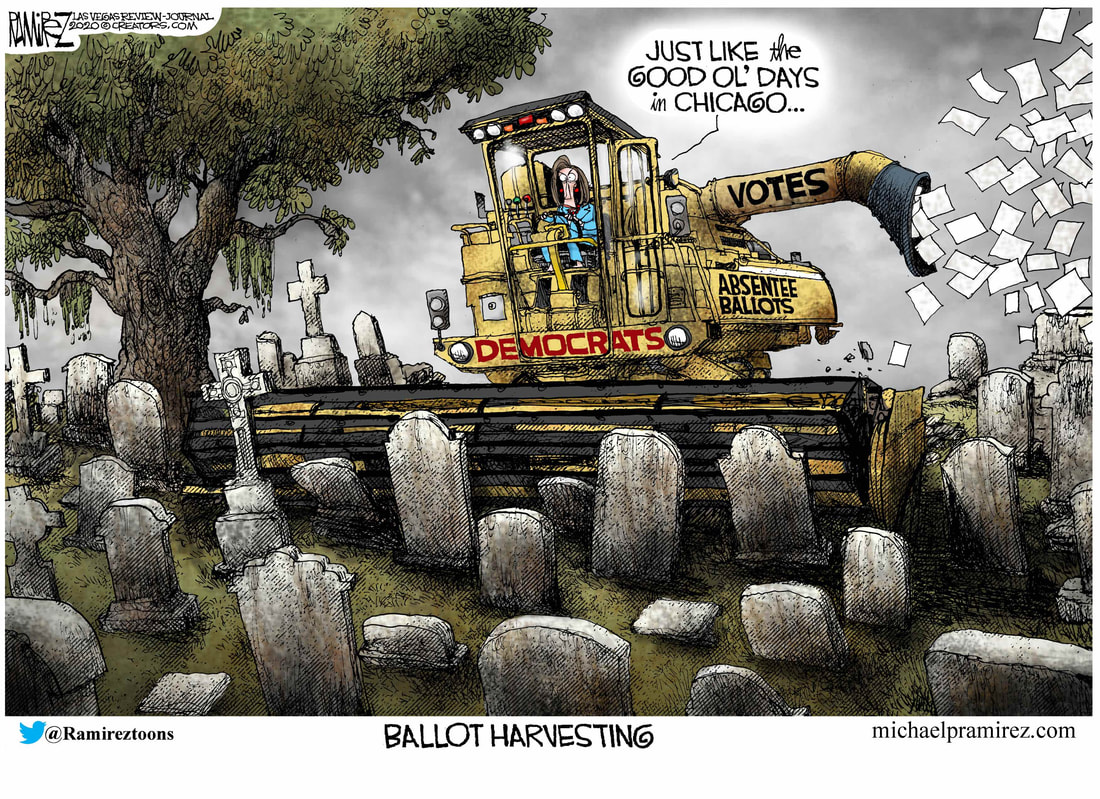|
|
|
Welcome to the official home and wonderful world of Pulitzer Prize Winning Political Cartoonist Michael P. Ramirez, daily editorial cartoonist for the Las Vegas Review Journal |
Mailing It In
Standardized absentee voting degrades democracy and encourages political illiteracy.
Kerry Jackson June 25, 2020 CITY JOURNAL
Politics and law
Voting by mail represents progress, we’ve been told; no one should have to leave his home to exercise the franchise. Thus goes the reasoning behind a new law that requires every registered Californian to receive a ballot for the fall election through the U.S. Postal Service. But will convenience voting yield better outcomes? More likely it will make them worse.
Assembly Bill 860, signed by Governor Gavin Newsom on June 18, is premised on ensuring safety in the era of the coronavirus. Yet Wisconsinites voted in person in April, and the predicted spike in coronavirus cases from that public assembly never materialized. The state’s caseload did climb, but no steep increase occurred in the days and weeks after the primary, just a steady rise that has continued, partly driven by expanded testing. Apparently the same can be said for the locations where George Floyd marches, encouraged by the media and many public officials, were held. The pandemic, it appears, was a useful crisis—voting by mail has long been a priority among progressives, and the coronavirus outbreak provided sufficient cover to institute it.
Proponents promise that vote-by-mail elections will be corruption-free. Yet we know that in the 2016 elections, as many as 319,000 mailed ballots were tossed out for various reasons, including signatures that didn’t match; that, according to a Los Angeles Times examination, “the preferred way to cheat is with mail-in ballots”; and that absentee ballots, typically submitted by mail, provide the “easiest” path “to commit election fraud.” read more
Standardized absentee voting degrades democracy and encourages political illiteracy.
Kerry Jackson June 25, 2020 CITY JOURNAL
Politics and law
Voting by mail represents progress, we’ve been told; no one should have to leave his home to exercise the franchise. Thus goes the reasoning behind a new law that requires every registered Californian to receive a ballot for the fall election through the U.S. Postal Service. But will convenience voting yield better outcomes? More likely it will make them worse.
Assembly Bill 860, signed by Governor Gavin Newsom on June 18, is premised on ensuring safety in the era of the coronavirus. Yet Wisconsinites voted in person in April, and the predicted spike in coronavirus cases from that public assembly never materialized. The state’s caseload did climb, but no steep increase occurred in the days and weeks after the primary, just a steady rise that has continued, partly driven by expanded testing. Apparently the same can be said for the locations where George Floyd marches, encouraged by the media and many public officials, were held. The pandemic, it appears, was a useful crisis—voting by mail has long been a priority among progressives, and the coronavirus outbreak provided sufficient cover to institute it.
Proponents promise that vote-by-mail elections will be corruption-free. Yet we know that in the 2016 elections, as many as 319,000 mailed ballots were tossed out for various reasons, including signatures that didn’t match; that, according to a Los Angeles Times examination, “the preferred way to cheat is with mail-in ballots”; and that absentee ballots, typically submitted by mail, provide the “easiest” path “to commit election fraud.” read more
What is ballot harvesting?
By Gregg Re | Fox News
Ballot harvesting, or the practice of allowing political operatives and others to collect voters’ ballots and turn them in en masse to polling stations, has drawn bipartisan concerns of fraud from election watchers.
Several states have enacted some restrictions on the practice, while others have expressly allowed it or failed to regulate it at all. According to a 2019 analysis by Ballotpedia, 24 states and the District of Columbia permit someone chosen by the voter to return mail ballots on their own, with nine of those states adding some specific exceptions.
Twelve states outline who specifically can return ballots (i.e., family members or caregivers); and one state explicitly requires only voters can return their ballots. Eleven states establish a limit on the number of ballots that a so-called "harvester" can return.
Imposing restrictions on the practice has led to legal challenges. In Arizona, a federal appeals court upheld a ballot harvesting prohibition, despite a claim that it unfairly discriminated against minorities who might need help filling out their ballots. read more
By Gregg Re | Fox News
Ballot harvesting, or the practice of allowing political operatives and others to collect voters’ ballots and turn them in en masse to polling stations, has drawn bipartisan concerns of fraud from election watchers.
Several states have enacted some restrictions on the practice, while others have expressly allowed it or failed to regulate it at all. According to a 2019 analysis by Ballotpedia, 24 states and the District of Columbia permit someone chosen by the voter to return mail ballots on their own, with nine of those states adding some specific exceptions.
Twelve states outline who specifically can return ballots (i.e., family members or caregivers); and one state explicitly requires only voters can return their ballots. Eleven states establish a limit on the number of ballots that a so-called "harvester" can return.
Imposing restrictions on the practice has led to legal challenges. In Arizona, a federal appeals court upheld a ballot harvesting prohibition, despite a claim that it unfairly discriminated against minorities who might need help filling out their ballots. read more
Watch: The Dave Sussman Show
Whiskey Politicswith Dave Sussman |
Whiskey Politics with Dave Sussman
|


